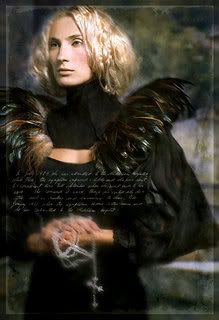
The contrast between the baroque apartment and the more austere composition of this scent is intentional according to Jacques Polge who created it, as he did with the whole new line.
31 Rue Cambon is an experimental chypre that omits the classic oakmoss note of the standard chypre composition and is touted as a "dry, musky, nutty scent." I think Serge Lutens tried a similar stunt with his Chypre Rouge, last autumn, which does not smell particularly chypre to me.
Here the formula starts indeed with a dry element that is sparkling and radiant. The substitution of oakmoss has resulted in a novel iris-pepper accord that according to dr.Turin is used here for the first time to render the impression of sensuality and powderiness that would normally be provided by the sensual backdrop of oakmoss and married to different batches of patchouli for the mossy feel. According to an interview of Polge in French paper Le Figaro, Polge is not a great fan of oakmoss anyway, because he finds the smell bitter. A self-proclaimed oriental lover, mr.Polge had to search for exotic varieties of patchouli growth to substitute the moss element that is needed in a chypre composition and came up with a new style. Which is not really chypre smelling either. In fact I would call it a chypre-oriental, if pressed to classify it and you will see why as you proceed.
The green spicy burst at the start gives way to softer accents following the herbal notes and the bergamot-rich top. The iris note here is neither earthy nor ethereal, as we’re sometimes used to perceiving it. Instead it hangs there twisting and turning in little waltz quick steps with the spiciness of the first olfactory hits when you spray the juice to your skin. The piquancy of pepper is very welcome and never overwhelming which suggests a restrained hand.
As it stays on it starts to develop more powdery and flowery aspects like –seemingly- hyacinth with rose and jasmine that remind us of the traditional heart of a classic chypre, yet the whole is based on a woody ambience of sandalwood and possibly amber that reminds me a lot of the soft sweetish echo of other perfumes in the line, like
28 La Pausa and Coromandel. Despite their initial claim that “we tried to do fragrances which are very different from one another” I think they also tried to lend a homogenous quality in them that would identify them as Chanel. I don’t think that could be very doable in so diverse a collection, but it does have familiarity with those and with other Chanels,as discussed before.
The lingering base of patchouli is as far away from headshop and earthy varieties as possible and certainly less pronounced than in Coromandel which seems a little more current and sensual in feeling.
In fact 31 Rue Cambon is quite Chanel in style as it aims at timelessness and probably the most elegant of the new lot.
Maybe because of those elements of wood and amber the lasting power in this one is not bad. It’s definitely not fleeting like the green fairy of Bel Respiro or the pretty posy of 28 La Pausa, but then it isn’t as satisfyingly lasting as Coromandel either, which is a pity.
The general effect is slightly aloof and certainly elegant, which will account for its marked success with people shopping Chanel and wanting to complement their expensive clothing and accessories with something fragrant in completely magnetic bottles (and I utter that last bit both figuratively -as the caps close magnetically- and figuratively).
Whether it is the best chypre in the last 30 years, as it had been initially hailed almost a month ago, remains to be judged upon subsequent applications and the test of time. I think it was rather an ambitious claim to begin with.
Art photography by Chris Borgman courtesy of his site.
.jpg)









